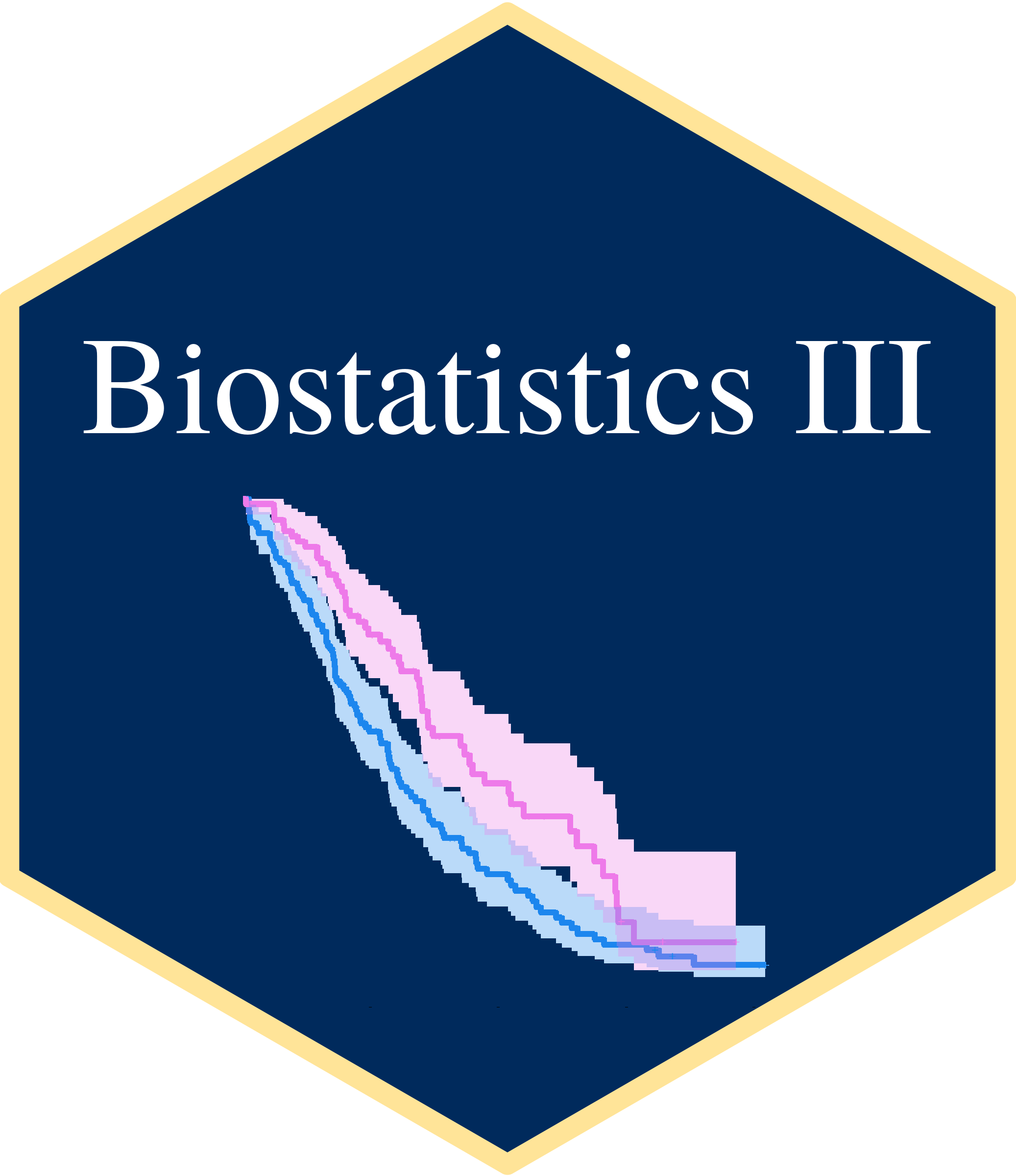Syllabus
Course Syllabus
Detailed course syllabus is posted on Quercus.
Course Info
Course title
HAD5319H Biostatistics III: Advanced Biostatistical Techniques for Observational Studies
Semester
Fall 2025: Sept 2, 2025 to Dec 2, 2025
Final date to add full-year and Fall session courses: Sep 17, 2025
Fall Reading Week: Oct 14-18, 2025 (No classes)
Final date to drop Fall Session courses without academic penalty: Oct 27, 2025
Course Description
This course is designed for students to understand and apply more advanced biostatistical techniques in the setting of complex observational studies. The goal is for students to gain experience in how to design and develop a statistical analysis plan, to carry out basic analysis using the statistical package R, to verify the findings and to interpret and report the results in a manner that is meaningful to clinicians and applied health scientists. The course will be given from an applied point of view; more theoretical understanding will be touched upon, but only to the extent of being useful in applications and for understanding the models. This course will cover 3 core advanced topics with added additional sessions to introduce newer techniques that focus on predictive modelling, heterogeneous treatment effects, and statistical programming.
This course will cover three core advanced topics.
- BLOCK 1. Complex Survival Models
- BLOCK 2. Longitudinal Models and Multi Level Models
- BLOCK 3. Prediction Models
Pre-requisites
- HAD5301H: Introduction to Clinical Epidemiology and Health Care Research, or equivalent
- HAD5307H: Introduction to Applied Biostatistics, or equivalent
- HAD5316H: Biostatistics II: Advanced Techniques in Applied Regression Methods, or equivalent
- basic programming knowledge in R or SAS. HAD5316H or CHL5202H may be taken concurrently with this course.
Course Reading and Resources
Reference Materials
Lecture slides and required readings such as journal articles will be posted on Quercus.
Suggested Text
- Statistics for Biology and Health, Springer Series
- David G. Kleinbaum & Mitchel Klein. Survival Analysis: “A Self-Learning Text”
- Dirk F. Moore. Applied Survival Analysis Using R
- Frans Willekens. Multistate Analysis of Life Histories with R
- Philip Hougaard. “Analysis of Multivariate Survival Data”
- Eric Vittinghoff, David V. Glidden, Stephen C. Shiboski, and Charles E. McCulloch. Regression Methods in Biostatistics: “Linear, Logistic, Survival, and Repeated Measures Models”
- Ewout W. Steyerberg. Clinical Prediction Models: “A Practical Approach to Development, Validation, and Updating”
- Geert Verbeke and Geert Molenberghs. “Linear Mixed Models for Longitudinal Data”
- Hans C. van Houwelingen & Hein Putter. “Dynamic Prediction in Clinical Survival Analysis”
R statistical Software
R can be downloaded from https://cran.r-project.org/. Many users of R like a tool called RStudio. This program is what is called an Integrated Development Environment (IDE) for R. It has several nice features, notably the ability to scroll backward through graphs you have created. You are welcome to use RStudio in the course which can be downloaded from https://rstudio.com/.
Evaluation
| Due dates (tentative) | Grade | |
|---|---|---|
| Individual report (BLOCK I) | Oct 2, 2025 | 10% |
| Group presentation (BLOCK I) | Sep 25, 2025 | 10% |
| Individual report (BLOCK II) | Oct 30, 2025 | 10% |
| Group presentation (BLOCK II) | Oct 28, 2025 | 10% |
| Individual report (BLOCK III) | Nov 27, 2025 | 10% |
| Group presentation (BLOCK III) | Nov 20, 2025 | 10% |
| Final Project | Dec 14, 2025 | 40% |
Accessibility and Accommodations
The University provides academic accommodations for students with disabilities in accordance with the terms of the Ontario Human Rights Code. This occurs through a collaborative process that acknowledges a collective obligation to develop an accessible learning environment that both meets the needs of students and preserves the essential academic requirements of the University’s courses and programs. For more information, or to register with Accessibility Services, please visit: http://studentlife.utoronto.ca/as.
Academic Integrity
Academic integrity is essential to the pursuit of learning and scholarship in a university, and to ensuring that a degree from the University of Toronto is a strong signal of each student’s individual academic achievement. As a result, the University treats cases of cheating and plagiarism very seriously. Help and information is available on the Academic Integrity website. The University of Toronto’s Code of Behaviour on Academic Matters (http://www.governingcouncil.utoronto.ca/policies/behaveac.htm) outlines the behaviours that constitute academic dishonesty and the processes for addressing academic offences.
Key Resources and Supports for DSLPH Graduate Students
License
This work is licensed under a Creative Commons Attribution-NonCommercial-ShareAlike 4.0 International License.
